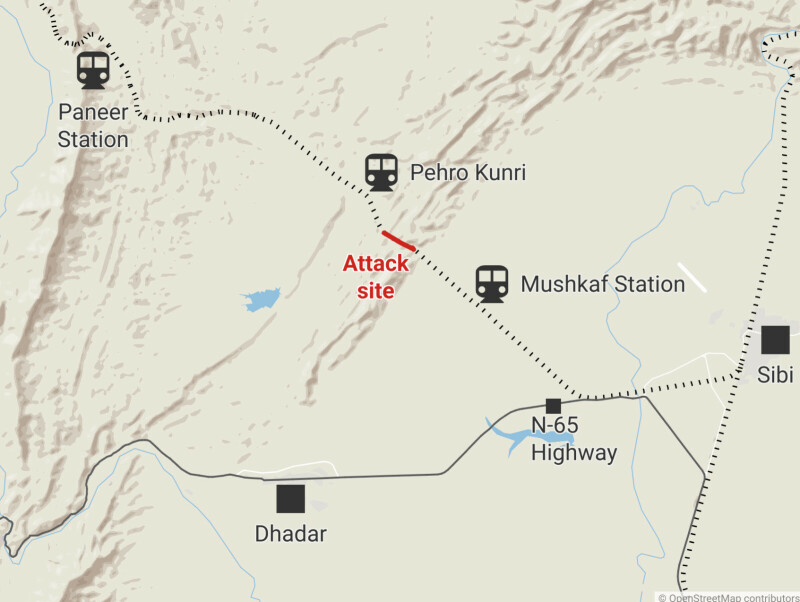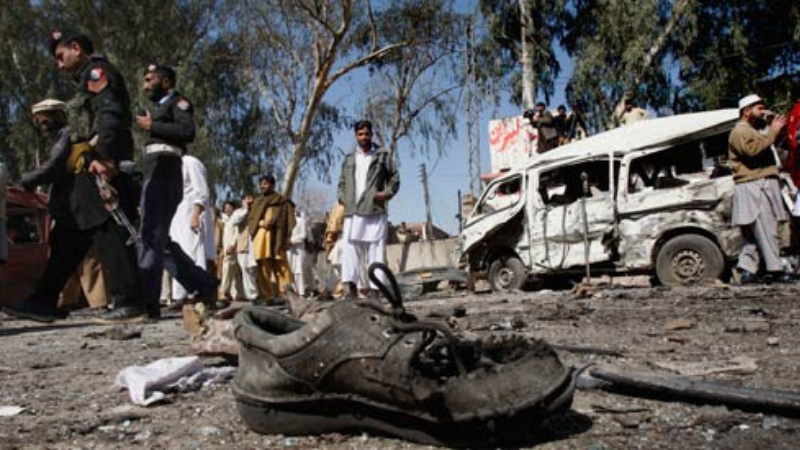The recent Jaffar Express train attack in Balochistan has once again shown the serious security issues in Pakistan. The attack, carried out by the Balochistan Liberation Army (BLA), caused one death (Train Driver) and injuries to many others. It also led to a hostage situation, forcing security forces to take action.
What Happened in the Attack?
On March 11, 2025, the Jaffar Express, traveling from Quetta to Peshawar, was attacked by BLA terrorists in Mashkaf, Dhadar, Bolan, Balochistan. The attackers blew up the tracks, stopping the train by derailing it between Tunnel 7 and Tunnel 8 in Dhadar, a remote and mountainous area with no roads nearby. The nearest road to this location is 25-30 Kilometers away.
During the attack, Train Driver Rana Amjad Yaseen was badly injured and later passed away. The terrorists took control of the whole train consisting of 9 bogies, holding about 450 passengers hostage, including women and children.
Who is Behind the Attack?
The Balochistan Liberation Army (BLA) is a militant separatist terrorist group that has carried out multiple attacks in Pakistan, demanding independence for Balochistan. The group has been designated as a terrorist organization by Pakistan, the UK, and the US. In recent years, the BLA has targeted security forces, infrastructure, and Chinese investments in the region.
Security officials reported that the attackers were in direct contact with their leaders in Afghanistan, receiving real-time instructions during the attack. The media wing of the BLA terrorist group also released a press release about this incident.

Hostage Situation and Terrorist Plan
After taking control of the train, the terrorists split into groups and spread across mountains, tunnels, and nearby areas. They used passengers as human shields to prevent security forces from attacking. Reports also confirmed that there were suicide bombers among the hostages, making the rescue mission even more dangerous.
Security Forces’ Response and Rescue Operation
Despite many challenges, Pakistan’s security forces started a careful rescue operation to defeat the terrorists and save the hostages.
- Hostages Rescued: A total of 346 passengers have been rescued so far.
- Progress So Far: 50 terrorists have been killed, and security forces are moving closer to full control of the area.
- Safe Transfer: 57 out of the 346 rescued passengers were taken to Quetta on 4 vehicles under high security, where their families were waiting. 37 injured were taken to hospital for treatments.
- Women & Children Rescued: Among the freed passengers, 31 were women and 15 were children.
- Mission Continues: Officials have said the operation will continue until all terrorists are eliminated.
Effect on Train Services
Because of the attack, Jaffar Express services have been stopped for three days. Also, Bolan Express services from Quetta to Karachi have been put on hold. Authorities have stated that train services will resume only after strict security measures are put in place to prevent future attacks.
National Reaction and Condemnation
The Balochistan train attack has been strongly condemned by Pakistan’s President, Prime Minister, and Interior Minister. Prime Minister Shehbaz Sharif stated, “The government will take strict action against those responsible and ensure the safety of all citizens.” The military leadership also emphasized a strong response against terrorist networks operating in the region.
Recent Terrorist Attacks in Balochistan
The Balochistan BLA attack on the Jaffar Express train is the latest in a series of violent incidents. In the past few months:
- A suicide bombing at Quetta Railway Station killed 32 people and injured 62.
- A police convoy in Turbat was attacked, leading to several deaths.
- A series of bomb blasts targeted security checkpoints in Balochistan.
These attacks show that terrorist groups in Balochistan remain a serious threat, and stronger security efforts are needed.
Conclusion: A Call for Vigilance and Stronger Security
The Jaffar Express train attack is a painful reminder of the dangers faced by Pakistan’s security forces and civilians. While the rescue mission has seen a success so far, the Balochistan terrorist attack highlights the ongoing security problems in the region. With continued efforts from security forces and the government, Pakistan remains committed to protecting its people and fighting against terrorism.
The country stands with the victims and their families, honoring the bravery of those who lost their lives and the efforts of those working to bring peace to Balochistan.

